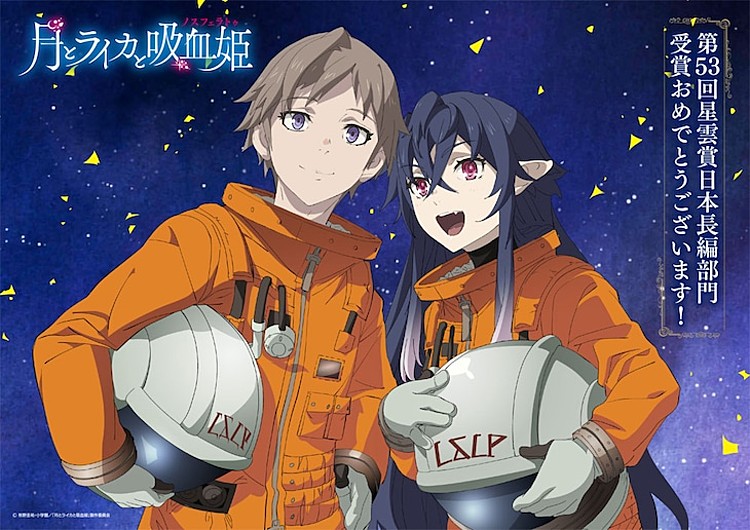News
Evangelion, Irina: The Vampire Cosmonaut, Godzilla S.P., Zettai Karen Children Win Seiun Awards
posted on by Egan Loo
 The 59th Japan Science Fiction Convention (Nihon SF Taikai) revealed the winners of the 53rd Seiun Awards on Saturday. The Evangelion franchise won the open "Non Category (Everything That Feels Sense of Wonder)" — specifically, "The Completion of Rebuild of Evangelion" to honor the conclusion of the 15-year film series.
The 59th Japan Science Fiction Convention (Nihon SF Taikai) revealed the winners of the 53rd Seiun Awards on Saturday. The Evangelion franchise won the open "Non Category (Everything That Feels Sense of Wonder)" — specifically, "The Completion of Rebuild of Evangelion" to honor the conclusion of the 15-year film series.
Evangelion was competing against the AI novelist (the July 2021 release of a novel entirely written by AI), the Uma Musume Pretty Derby project, the Super Robot Wars games' 30th anniversary, the 200-million-yen (about US$1.5 million) donation surge for Professor Toru Miyazaki's drug research for kidney disease in cats, the erecting of the life-size Nu Gundam and Freedom Gundam statues, and SpaceX's first orbital spaceflight crewed with only private civilians.
Keisuke Makino's seven-volume Irina: The Vampire Cosmonaut (Tsuki to Laika to Nosferatu) novel series and Taiyō Fujii's Man-kinds (Man Kind) serialized novel won the "Best Japanese Long Story" award. Hiromi Kato, the character designer of the Irina: The Vampire Cosmonaut anime, drew an illustration to celebrate the news:

Among the category's nominees this year were the Yamato anime's Uchū Senkan Yamato: Reimei-hen Aquarius Algorithm (Space Battleship Yamato Dawn Arc: Aquarius Algorithm) novel, Kaname Seu's 11-volume WorldEnd follow-up series Shūmatsu Nani Shitemasu ka? Mō Ichido Dake, Aemasu ka? (What Do You Do at the End of the World? Can We Meet, Just One More Time?), Baku Yumemakura's JAGAE Oda Nobunaga Denkikō, and El Hazard and Noir anime creator Ryoe Tsukimura's Kiryū Keisatsu: Shirahone Kaidō (Police Dragoon: Shirahone Highway).
Seven Seas is publishing Irina: The Vampire Cosmonaut in English. Fujii previously won the same award in 2015 for Orbital Cloud, published in English by Viz's Haikasoru imprint.
 The Godzilla Singular Point anime won the Best Media award. The nominees in the category were:
The Godzilla Singular Point anime won the Best Media award. The nominees in the category were:
- Vivy -Fluorite Eye's Song-
- Godzilla Singular Point
- Knights of Sidonia: Love Woven in the Stars
- Dune
- Sing a Bit of Harmony
- Evangelion: 3.0+1.0: Thrice Upon A Time
- Nippon Chinmotsu - Kibō no Hito (Japan Sinks - People of Hope), a live-action television series of Sakyo Komatsu's Japan Sinks (Nihon Chinmotsu) science fiction novel starring Shun Oguri
- Natsu e no Tobira - Kimi no Iru Mirai e (The Door into Summer - Toward a Future With You), a live-action film of Robert A. Heinlein's time-travel novel The Door into Summer
 Takashi Shiina's Zettai Karen Children manga, which ended in 2021 after 63 volumes, won the Best Comic award. The nominees in the category were:
Takashi Shiina's Zettai Karen Children manga, which ended in 2021 after 63 volumes, won the Best Comic award. The nominees in the category were:
- Fumi Yoshinaga's Ōoku: The Inner Chambers (complete in 19 volumes)
- Hajime Isayama's Attack on Titan (complete in 34 volumes)
- Rasenjin Hayami's Danshaku ni Fusawashii Ginga Ryokō (A Galactic Voyage Fit For a Baron, complete in 3 volumes)
- Takashi Shiina's Zettai Karen Children (complete in 63 volumes)
- Ryō Aizawa's Astronaut Neko (Astronaut Cat)
- Paru Itagaki's BEASTARS (complete in 22 volumes)
- Hirohiko Araki's JoJolion (complete in 27 volumes)
- Kazuhiro Fujita's Sou-Bou-Tei Kowasu Beshi (Sou-Bou-Tei Must Be Destroyed, complete in 25 volumes)
Satoshi Ogawa's "SF Sakka no Taoshikata" (How to Beat Sci-Fi Writers) won the "Best Japanese Short Story" award.
The Martian author Andy Weir's Project Hail Mary novel (translated by Kazuko Onoda) won the "Best Translated Long Story" award, and James Alan Gardner's "The One With the Interstellar Group Consciousnesses" short story (translated by Chiori Sada) won the "Best Translated Short Story" award. Gakken no Zukan Super Sentai, Gakken's 280-page visual encyclopedia of Toei's live-action tokusatsu (special-effects) franchise, won the "Best Non-Fiction" award.
Studio Nue's Naoyuki Katō (The Legend of the Galactic Heroes) won the Best Artist category for the ninth time since 1979.
The nominees were chosen among works that were released between January 1 and December 31, 2021. Those who registered for the 59th Japan Science Fiction Convention could vote online for the winners between May 15 and June 30.
"Seiun Shō" literally translates to "nebula awards," but the Japan SF Con's Seiun Awards are more akin to the Hugo Awards, in that the attendees of each respective convention vote on the winners. There is another set of awards, the Science Fiction and Fantasy Writers of Japan's Nihon SF Taishō honors, that are the rough Japanese equivalent of the Science Fiction and Fantasy Writers of America's Nebula Awards. Like the Hugo Awards, the Seiun Awards honor all forms of speculative fiction — including but not limited to science fiction — and related materials.
Previous winners of the Seiun Awards include Kemono Friends, And Yet the Town Moves, Shin Godzilla, Kochikame, Girls und Panzer, Knights of Sidonia, The World of Narue, Bodacious Space Pirates, Range Murata, Masamune Shirow, Makoto Shinkai, Full Metal Alchemist, Gundam: The Origin, 20th Century Boys, Summer Wars, Card Captor Sakura, Madoka Magica, Pacific Rim, Space Battleship Yamato 2199, Moyashimon, Astra Lost in Space, How Many Light-Years to Babylon?, Batman Ninja, and more.
Last year, Natsumi Eguchi's Hozuki's Coolheadedness manga and Toriko Gin's Kimi o Shinasenai tame no Storia (Story for the Sake of Keeping You Alive) manga both won the "Best Comic" award. In addition, Kiyotaka Taguchi and Tsuburaya Productions' live-action television series Ultraman Z won the "Best Media" award.
Sources: Japan Science Fiction Convention (Opening Ceremony), Comic Natalie, 4Gamer
this article has been modified since it was originally posted; see change history